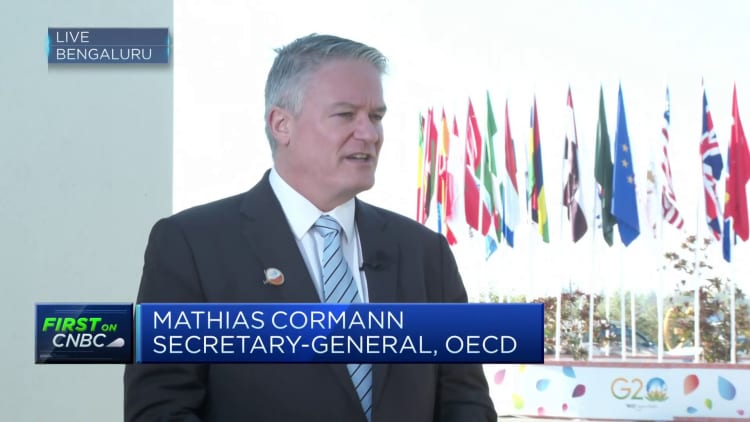
OECD Secretary-General Mathias Cormann said the global economic outlook is “slightly brighter” this year but inflation challenges remain.
“The outlook for the world is slightly brighter at the beginning of 2023 than what we thought it would be just two or three months ago,” he told CNBC’s “Street Signs Asia” on Friday.
“Indeed, energy and food prices are substantially lower than what they were at their peaks,” noted the OECD chief, ahead of a G-20 financial leaders meeting this week in Bengaluru, India.
Energy prices have fallen significantly because Europe was able to “successfully” diversify its sources of energy, Cormann noted. In addition, a “benign winter” helped to reduce energy demand which kept gas prices low, he said.
In November, the OECD said “Russia’s war of aggression against Ukraine has provoked a massive energy price shock not seen since the 1970s.”
“The global economy is projected to grow well below the outcomes expected before the war – at a modest 3.1% this year [2022], before slowing to 2.2% in 2023 and recovering moderately to a still sub-par 2.7% pace in 2024,” it added.

That report further highlighted Asian emerging-market economies are expected to account for close to three-quarters of global GDP growth in 2023, as Europe and the U.S. slow down sharply.
Still, inflation risks continue to persist and need to be tackled well, said the OECD chief.
“Inflation is starting to tick down, but we are not on top of the inflation challenge yet. There is more work to be done to tackle inflation and that comes with risks,” noted Cormann. “And these are risks that will need to continue to be managed well over the weeks and months.”
The OECD chief highlighted the U.S. Federal Reserve took “aggressive action last year,” in terms of hiking interest rates to rein in surging price pressures.
Now the Fed continues to fight inflation in “a more steady fashion allowing the data to come through and allowing… the measures that are in the pipeline to take effect,” Cormann noted. “That is what we expect central banks around the world to do, to continue to monitor the data and to continue to adjust the decisions.”
In early February, the U.S. central bank raised its benchmark interest rate by a quarter percentage point and gave little indication it is nearing the end of this hiking cycle.
Last month, the OECD chief highlighted China’s reopening is “overwhelmingly positive” in the global fight to tackle surging inflation. In early December, Beijing suddenly shifted away from its zero-Covid policy.
“Over the medium to longer term, this is a very much a positive in terms of making sure that the supply chains function more efficiently and more effectively, making sure that demand in China and indeed trade more generally resumes in a more positive pattern,” Cormann told CNBC at the World Economic Forum in Davos, Switzerland.

報告顯示,中國電力投資加速增長,預計2024年電網基建投資將超過5300億元。
近日,市場迎來了一則引人注目的消息:工業巨頭3M公司(MMM.N)在本周五公布了其季度業績報告,隨後股價飆升至近兩年來的
最近,外媒給OpenAI算了筆賬,今年可能要血虧50億美元。
近日,巴黎奧運會和世界鐵人三項協會聯合發布了一項重大決定,宣布因塞納河水質污染問題,原定於近期進行的奧運會鐵人三項首次下
當地時間7月18日,法國巴黎發生了一起令人震驚的持刀襲警事件。
近期,一則重大消息在國際舞臺上引起軒然大波,馬來西亞宣布加入金磚國家。
調查發現,互聯網和智能手機的使用幹擾了韓國近五分之一學生的生活。